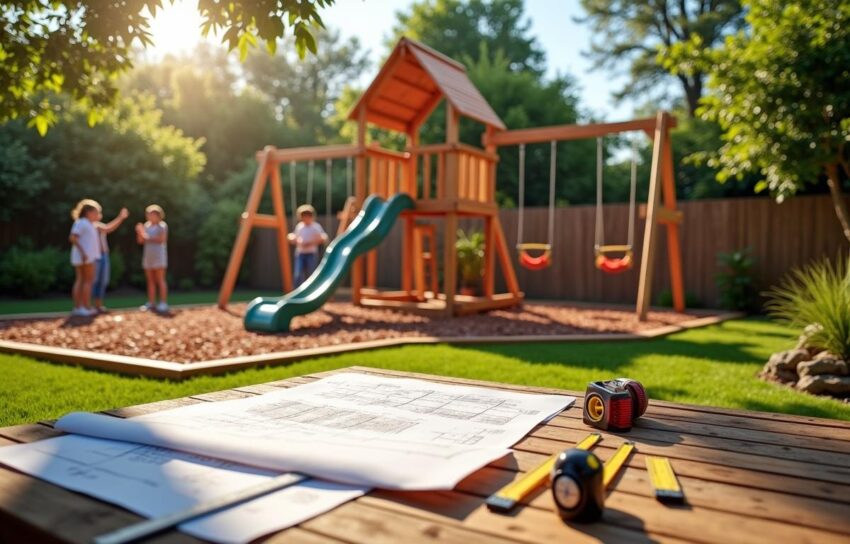Learning how to build a playground in your backyard can create a fun and engaging space for your family, offering endless opportunities for outdoor play and memories. Organizing materials and picking the right spot can feel like a puzzle.
Yet a few practical steps set you up for success if you plan ahead. Enjoy each part of the process, from brainstorming creative ideas to watching your children enjoy the finished product.
Contents
Essential First Steps
Start by picturing how you want your play area to look. Do you want an open space with a single slide, or do you see a mini adventure zone with monkey bars and a climbing net? Measure your yard, and note spots that catch too much sun or remain shady. This helps you tailor the design to your kids’ preferences while keeping the space suitable for changing weather.
Check local regulations and permit requirements before you order materials. Some neighborhoods have guidelines on structure height or distance from property lines. If you live near neighbors, consider how noise might travel. By staying aware of these details, you avoid complications and keep your project running smoothly.
Structure your timeline so you have enough time for planning, ordering supplies, and actual assembly. Many parents find it helpful to mark milestones on a calendar, like when to start digging or when slides are scheduled to arrive. This approach offers a clear sense of progress and keeps stress levels low.
Backyard Playground Design Ideas
To spark inspiration, think about your children’s favorite activities. Swings and slides are classics, but your family might also enjoy climbing walls, tunnels, or imaginative play spaces. You can incorporate platforms for pretend play, or even a small stage for talent shows. Visiting local playground equipment suppliers helps you see the latest products and compare quality before making final decisions.
Beyond traditional swings, you might explore batting cage netting solutions if your children love sports. This setup keeps balls contained and protects windows or delicate plants. It’s a clever feature for budding athletes who want to practice in a safe, contained environment. Just remember to keep it proportional so it doesn’t overshadow the rest of your play area.
Site Selection and Preparation
Your chosen site influences everything from overall design to safety. Look for level ground that simplifies installation. If the area has a slight slope, decide whether to level it fully or adjust the play equipment to fit. A balanced layout helps kids stay stable while they run around.
Perform thorough drainage checks before construction, especially in areas that collect water after rain. Standing water can weaken wood and attract insects, so address any drainage concerns early. Adding a simple French drain or grading the soil may save you from structural headaches in the future. A well-prepared base keeps your playground ready for action year-round.
Cost to Build a Playground in Backyard
Budgeting is key when deciding how extensive your playground will be. Consider how many features you want and the materials required. The cost of building a backyard playground also depends on local labor rates if you plan to hire help. Always compare prices at different stores, and don’t forget to factor in shipping for large items.
Expect to invest in quality hardware and finishes that can withstand weather changes. Galvanized screws and rust-resistant chains are small details that prolong the life of your structure. You can also explore reclaimed wood or composite materials for a more eco-friendly approach. By balancing cost with durability, you ensure your playground remains fun for years.
DIY Backyard Playground Equipment
Some families enjoy tackling each part of the build themselves. DIY playground construction materials range from standard lumber and plywood to more creative options like old tires or cargo nets. Whether you follow a detailed blueprint or craft each component from scratch, keep measurements precise. This approach gives you full control over the final look and function.
Begin with simpler projects like a wooden swing frame before moving on to advanced structures. If you want to add rope ladders or monkey bars, double-check weight capacities for hardware. Test out each piece as you go, ensuring it’s safe and secure. When done well, a do-it-yourself approach can become a rewarding family project.
Maintenance and Safety Considerations
Ongoing maintenance keeps your setup enjoyable and hazard-free. Common backyard playground safety tips include tightening loose bolts and replacing worn-out ropes. It’s good practice to scan the area for broken parts or rust each month. Simple fixes today can avert larger repairs down the line.
Ground protection plays a big role in reducing injuries. You might choose wood chips, rubber mulch, or even pour-in-place rubber. If you want a lush surface, seek soft turf installation advice so you know how to lay artificial grass properly. Drainage is still important, because standing water on turf can encourage mold.
Beyond equipment checks, keep an eye on the surrounding landscape. Climbing vines or low-hanging branches could create unexpected obstacles. By trimming greenery and removing clutter, you allow your children to explore every corner without unnecessary risks. These small tasks make a big difference in long-term enjoyment.

